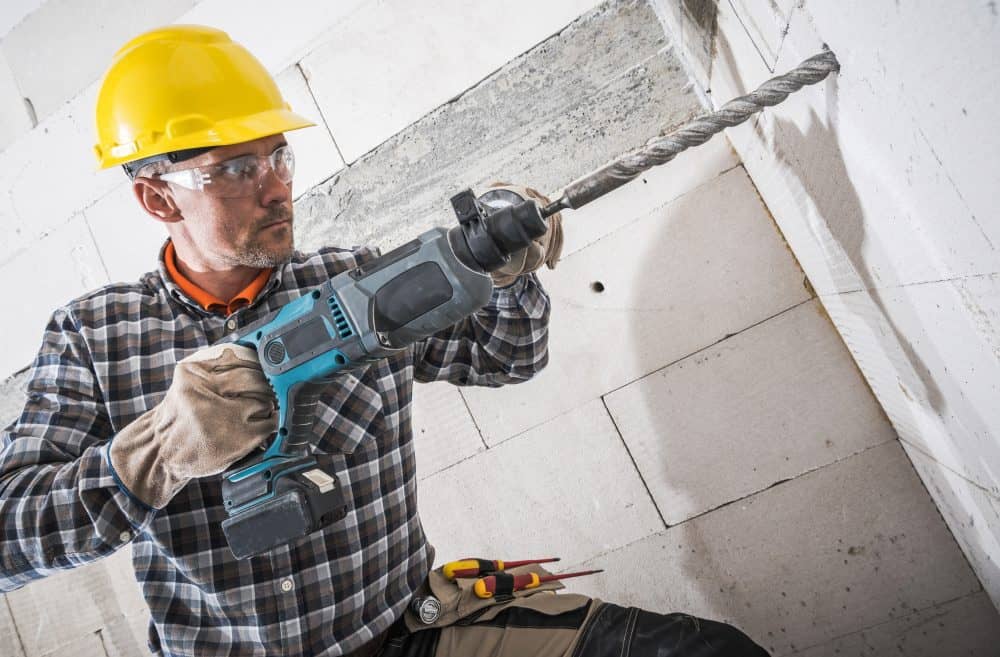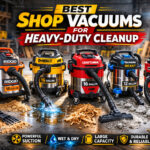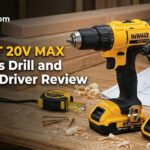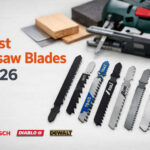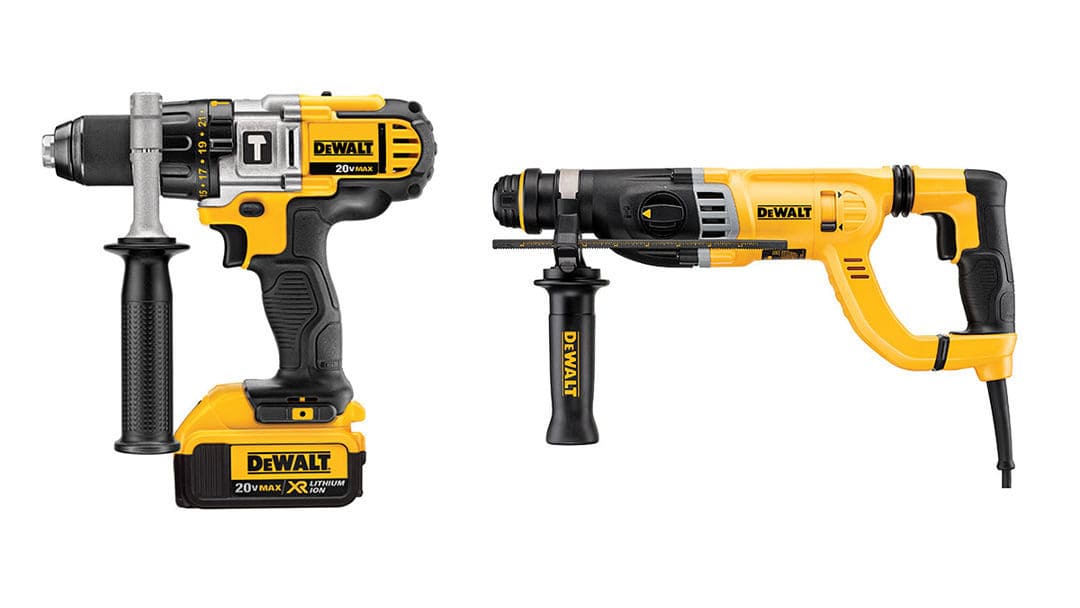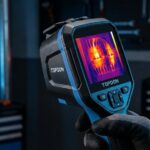You’ve been there. You’re trying to hang a shelf on a brick wall, or mount a TV bracket on that mystery wall in the basement. You grab your trusty drill, push with all your might, and… nothing. Just a cloud of dust and a slightly polished spot on the wall. Your standard drill bit is dull, your arm is tired, and your frustration is maxed out. This is the exact moment you realize you need a tool with more punch. You need a hammer drill. If you’re ready to stop struggling and start drilling into hard materials like a pro, this guide will help you find the best hammer drill for the job.
What Exactly Is a Hammer Drill and How Does It Work?
A hammer drill looks a lot like a standard drill, but it has a secret weapon. In addition to spinning the drill bit, it also delivers a rapid succession of forward hammer-like blows. Think of it as drilling and punching at the same time.
This “hammering” action is created by two ribbed discs (a cam-action mechanism) that click past each other, creating a high-frequency, high-impact pulsation. We’re talking thousands of Blows Per Minute (BPM). This action pulverizes hard, brittle materials like concrete, brick, and block, allowing the spinning flutes of the masonry bit to clear away the debris.
The best part? On virtually every model, you can switch the hammer function off with the flick of a switch. This turns it back into a standard high-torque drill, perfect for boring large holes in wood or metal.
When Do You Actually Need a Hammer Drill?
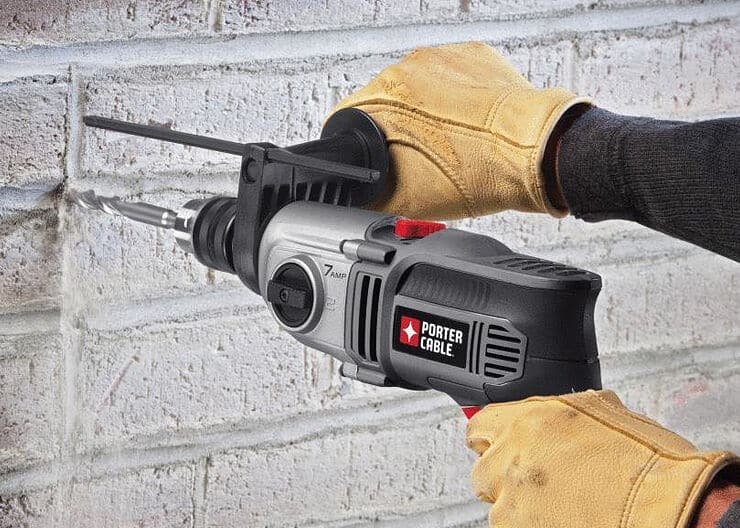
A hammer drill is a specialized tool, but for certain jobs, it’s the only tool. It’s the bridge between a regular drill and a full-blown rotary hammer.
- Drilling into Poured Concrete: This is the hammer drill’s main event. It’s essential for setting concrete anchors like Tapcons for railings, posts, or machinery.
- Working with Brick and Mortar: Need to mount a hose reel, satellite dish, or security camera on a brick wall? A hammer drill makes quick and clean work of it.
- Installing Fixtures on Block Walls: Whether it’s a cinder block or a decorative stone veneer, the hammer action is necessary to get through the aggregate.
- Heavy-Duty Drilling: With the hammer mode turned off, these tools often have more powerful motors and gearboxes than standard drills, making them great for driving large hole saws or auger bits through thick wood.
Hammer Drill vs. Impact Driver vs. Rotary Hammer
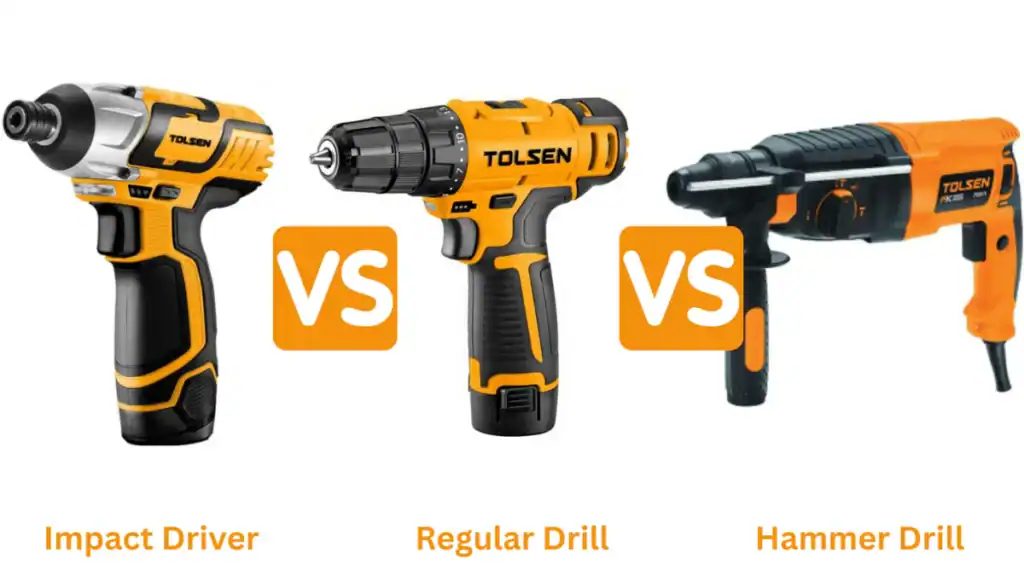
This is one of the most common points of confusion for tool buyers. All three tools sound aggressive, but they do very different jobs. Let’s clear it up.
| Tool Type | Primary Action | Primary Use | Best For |
|---|---|---|---|
| Hammer Drill | Spins + High-Speed Forward Taps | Drilling holes in masonry (brick, concrete) | Holes up to 1/2″ in concrete; setting anchors. |
| Impact Driver | Spins + Rotational Impacts | Driving screws and fasteners | Driving long deck screws, lag bolts. Not for drilling masonry. |
| Rotary Hammer | Spins + Piston-Driven Heavy Blows | Chipping & drilling large holes in concrete | Demolition; drilling holes over 1/2″ in dense concrete. |
The key takeaway: a hammer drill is for drilling holes in masonry. An impact driver is for driving screws. And if your job involves serious concrete demolition or drilling massive holes for rebar, you’ll need a much more powerful rotary hammer.
Buying Guide: Choosing the Best Hammer Drill in 2025
Ready to pull the trigger? Here’s what separates the job site heroes from the benchwarmers.
Key Features to Look For
- Motor: Brushless vs. Brushed: Go brushless. It’s the modern standard. Brushless motors are more efficient, run cooler, and deliver more power and runtime from the same battery compared to older brushed designs.
- Power Source: Corded vs. Cordless: Modern cordless hammer drills from top brands are now so powerful that they match or exceed the performance of many corded models. For most users, the convenience of a cordless tool is the clear winner. Corded is only necessary for all-day, non-stop use in a single location.
- Chuck Size: A 1/2-inch chuck is the professional standard. It’s more robust and accepts a wider range of larger bits than the 3/8-inch chucks found on smaller drills.
- Power Ratings (BPM & Torque): Higher Blows Per Minute (BPM) generally means faster drilling in masonry. Torque (measured in in-lbs or Nm) is more important for when you’re using it as a standard drill for large-diameter bits.
- Side Handle: Don’t buy a hammer drill without a removable side handle. When a large bit binds up in concrete, the tool can violently twist. A side handle gives you the leverage you need to stay in control and protect your wrist.
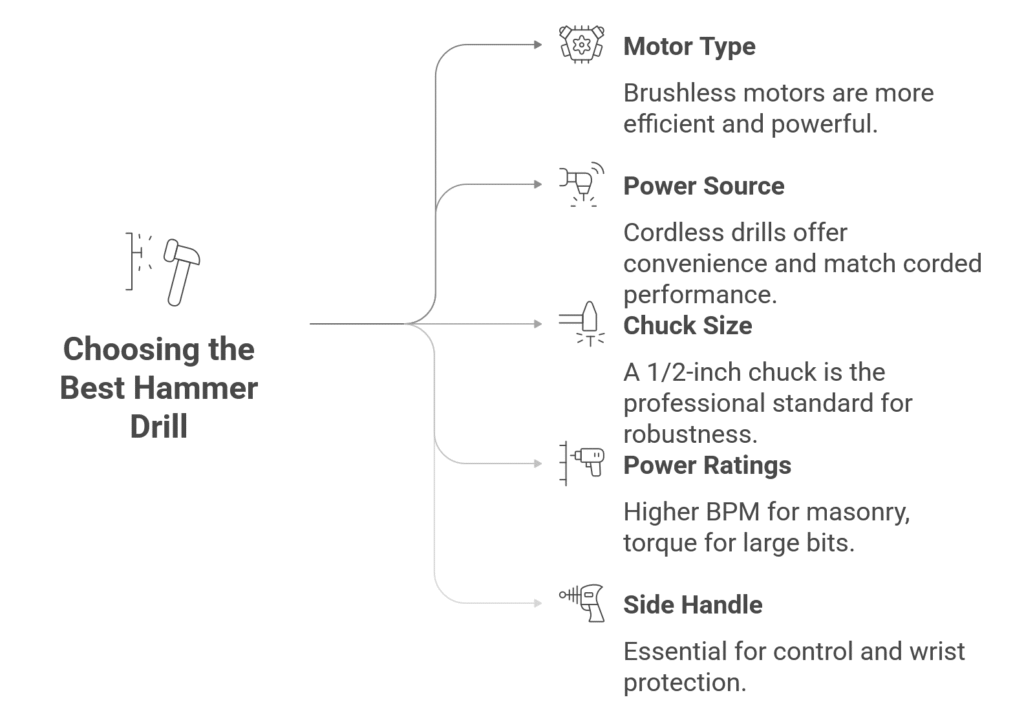
Our Top Hammer Drill Picks
Best Overall: Milwaukee M18 FUEL 1/2 in. Hammer Drill (2904-20)
This is the king of the hill right now. Milwaukee’s M18 FUEL line is famous for its incredible power and durability. The 2904-20 is compact for its power class, features an advanced anti-kickback control, and drills through concrete faster than almost any other cordless competitor. It’s pure, professional-grade muscle.
Milwaukee M18 FUEL 1/2 in. Hammer Drill – The most powerful and feature-packed cordless option for professionals who demand the absolute best performance.
- 1/2" all-metal chuck with carbide teeth for maximum durability, grip and bit retention
- Mechanical Clutch for consistency in driving a wide range of fasteners
- Unmatched Performance with the most runtime in class with the 5.0Ah batteries
- Hammer Drill Mode for Fast Drilling into Brick, Block or Concrete
- All-metal belt clip for portability
Best Value: DEWALT 20V MAX XR Brushless Hammer Drill (DCD996B)
The DCD996B has been a job site legend for years for a reason. It’s brutally powerful, incredibly tough, and its 3-speed transmission gives you fantastic control. While newer models are slightly more compact, this DeWalt remains a top-tier performer at a price that often beats the competition. It’s a fantastic investment.
DEWALT 20V MAX XR Hammer Drill – A pro-grade workhorse that delivers premium power and reliability without the absolute highest price tag.
- DEWALT-built high power, high efficiency brushless motor of DEWALT 20V hammer drill delivers up to 75% more runtime vs. 18V NiCad brushed motors
- The cordless hammer drill features heavy-duty 1/2-inch ratcheting nitro-carburized metal chuck with carbide inserts for superior bit gripping strength
- 3-Mode LED provides lighting in dark or confined spaces up to 20X brighter than previous model
- LED Spotlight Mode features 20 minute shutoff function allowing for extended work time in dark or confined spaces
Best Compact: Makita 18V LXT Sub-Compact Hammer Drill (XPH11ZB)
Sometimes, power isn’t everything—size is. If you’re working between studs or in tight cabinets, the Makita Sub-Compact is a lifesaver. It delivers legitimate hammer drilling performance in a package that feels more like a 12V tool. It won’t be the fastest in a concrete race, but it will get the job done where bigger drills can’t even fit.
Makita 18V LXT Sub-Compact Hammer Drill – The perfect solution for electricians, plumbers, and remodelers who need masonry capability in a lightweight, compact form factor.
- Compact and ergonomic design at only 6-15/16" long
- Weighs only 2.9 lbs. With battery (battery not included) for reduced operator fatigue
- Ideal for working in tight spaces
- Mechanical variable 2-speed transmission (0-500 & 0-1, 700 RPM) (0-7, 500 & 0-25, 500 BPM) for a wide range of drilling, fastening and hammer drilling applications
- Dual L.E.D. Lights illuminate the work area
Best Corded: DEWALT DWE5010 1/2-Inch VSR Corded Hammer Drill
If you don’t want to mess with batteries and just need a reliable, powerful drill for your workshop, this is it. The DeWalt DWE5010 is a simple, no-frills corded hammer drill with a powerful 7-amp motor that will handle any masonry drilling task a homeowner or serious DIYer can throw at it. It’s built to last and provides unbeatable performance for the price.
DEWALT DWE5010 Corded Hammer Drill – An affordable, powerful, and ultra-reliable corded option for endless runtime in the garage or workshop.
- 2.6 Joules of impact energy for fast drilling in concrete.
- Lightweight design makes this tool ideal for forming, rod hanging, structural connections, beam & column anchorage, steel stanchion mounting, and clip & bracket mounting.
- Brushless motor and durable German-engineered mechanism for efficient performance and runtime.
- Rotating dial to set tool to a specific application mode - Drill, Hammer Drill, or Chip.
- Includes: DCH133 Rotary hammer, 360° Side handle , Depth rod
Safety and Maintenance Tips
A hammer drill is a powerful tool that demands respect. Use it correctly, and it’ll serve you well for years.
Staying Safe on the Job
- Eyes and Ears: This is non-negotiable. Drilling masonry is loud and creates flying chips of rock. Always wear the right safety glasses and hearing protection.
- Use That Side Handle: I’m saying it again because it’s that important. When using large bits, a bind-up can break your wrist. The side handle is your best defense against the tool’s immense torque.
- Watch for Rebar: When drilling into structural concrete, be aware that you might hit steel rebar. Most hammer drills can’t cut through it and will bind violently.
- Proper Bits Are Key: You *must* use carbide-tipped masonry bits designed for hammer drilling. A standard twist bit will be destroyed in seconds. Using the correct masonry drill bits is essential.
Tool Maintenance 101
Keeping your hammer drill in top shape is easy. Follow the same basic rules from our power tool maintenance checklist.
- Keep Vents Clean: Concrete dust is fine and abrasive. Use compressed air to regularly blow out the motor vents to prevent overheating.
- Chuck Care: After a job, clean any dust out of the chuck mechanism to ensure it continues to grip bits tightly.
- Battery Health: For cordless models, store batteries in a temperate, dry place. Don’t leave them in a freezing truck overnight or a scorching hot car all day.
Frequently Asked Questions (FAQs)
1. Can I use a hammer drill as a regular drill?
Yes! Every hammer drill has a “drill-only” mode that turns off the hammering action. They actually make excellent regular drills because they are built with powerful motors and durable gearboxes.
2. What is the main difference between a hammer drill and a rotary hammer?
A hammer drill uses a mechanical cam action for rapid, light blows (high BPM, low impact). A rotary hammer uses a pneumatic piston mechanism for slower, much harder blows (lower BPM, high impact). A rotary hammer is far more powerful and is the right tool for drilling holes larger than 1/2-inch in concrete or for any chipping/demolition work.
3. Why is my hammer drill not drilling into the concrete?
There are a few likely culprits: 1) You’re using a dull or incorrect (non-masonry) bit. 2) You’re not applying enough steady, firm pressure. 3) The hammer function isn’t engaged. 4) You’ve hit steel rebar.
4. Can a hammer drill go through rebar?
No. A standard hammer drill with a masonry bit will not drill through steel rebar. You would need a specialized rebar-cutting drill bit and, more appropriately, a powerful rotary hammer.
5. Is a cordless or corded hammer drill more powerful?
In the past, corded was always more powerful. Today, high-end cordless models from brands like Milwaukee and DeWalt are just as powerful, if not more powerful, than many mid-range corded models. For the absolute highest sustained power, a high-end corded model still has an edge, but the gap has closed dramatically.
6. Can I use a hammer drill for mixing concrete or mortar?
Yes, in a pinch. With the hammer mode off and a mixing paddle attachment, the high torque makes it effective for mixing small batches. However, doing this frequently can put a lot of strain on the motor. A dedicated, low-speed mud mixer is the right tool for that job.
Conclusion: The Power to Go Through Anything
A hammer drill is a cornerstone tool for anyone who needs to work with masonry. It bridges the critical gap between a standard drill’s finesse and a rotary hammer’s brute force. It empowers you to take on projects you simply couldn’t before, from building a garden wall to finishing your basement. Investing in a quality tool like the Milwaukee M18 FUEL or the DEWALT DCD996B means you’ll have the power and reliability to drill through tough materials for years to come. For any serious builder, remodeler, or DIYer, having the best hammer drill in your kit is not a luxury—it’s a necessity.

